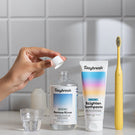Diabetes is a chronic condition that affects millions of people worldwide. According to the International Diabetes Federation, India alone had over 73 million individuals living with diabetes in 2017. This number was expected to grow to 134 million people by 2045 led by a rapid growth in prevalence in urban India.
While diabetes is widely known for its impact on overall health, did you know that it can also affect your oral health? That's right, diabetes has a hidden connection to your teeth and gums. In this blog post, we'll explore the relationship between diabetes and oral health and what you can do to protect your smile.
The Connection Between Diabetes and Oral Health
Studies have shown that people with diabetes are at an increased risk for gum disease, tooth decay, and other oral health problems. This is because high blood sugar levels can weaken the immune system, making it harder for the body to fight off bacteria that cause gum disease, infections and other oral health problems. Moreover, the occurrence of gum diseases and dental infections can take longer to heal and even worsen other symptoms of the diabetes.
Higher blood sugar levels result in higher sugar levels in the saliva too. Bacteria present in plaque use this high sugar content in saliva for sustenance. These bacterial infections eventually lead to tooth decay, cavities, and a host of other issues. If the affected tooth is left untreated, a diabetic patient might experience tooth loss.
Additionally, people with uncontrolled diabetes are more likely to experience dry mouth, which can lead to a higher risk of tooth decay and gum disease as well.
Symptoms of Diabetes and Oral Health
Oral manifestations of diabetes are varied but prominent. Let us have a look at some common symptoms of oral health problems and diabetes.
- Xerostomia – usually referred to as dryness of the mouth.
- Delayed wound healing – impaired healing of wounds or ulcers in the mouth.
- Increased severity of infection in mouth – diabetes might result in increased rates of incidence as well as severity of oral infections.
- Parotid salivary gland enlargement – “Parotitis” is the medical term for a swollen parotid gland. Your parotid glands are located on the side of your face, between your ear and your jaw.
- Gingivitis - It is a common gum disease causing irritation, redness and swelling of your gums
- Thrush – Diabetics who take antibiotics are prone to contracting fungal infections in the mouth called thrush.
How to Protect Your Smile if You Have Diabetes
- Control your blood sugar levels. Maintaining good blood sugar control is crucial for overall health, including oral health. Make sure to follow your doctor's instructions and monitor your blood sugar levels regularly.
- Practice good oral hygiene. Brush your teeth twice a day, floss daily, and visit your dentist regularly for cleanings and check-ups. This will help to remove plaque and prevent gum disease. If you wear dentures, clean them daily.
- Stay hydrated. Dry mouth can be a side effect of diabetes, so it's important to drink plenty of water to keep your mouth hydrated.
- Avoid sugary foods and drinks. High sugar intake can lead to tooth decay, so it's important to limit your consumption of sugary foods and drinks.
- Inform your dentist about your diabetes. Your dentist needs to be aware of your diabetes so they can adjust their treatment plan accordingly. They may also be able to provide additional tips and recommendations to help keep your smile healthy.
- Quit smoking.
Check Out Daybreak’s Range of Oral Care Essentials
With an increase in salivary glucose levels among diabetic patients the saccharolytic bacteria in saliva starts decaying tooth and oral tissues. SLS, a surfactant, is added to most commercial toothpastes as a foaming agent. This SLS is also known to be an irritant to the oral tissues. Daybreak Brighten toothpaste is an SLS-free and fluoride-free toothpaste made from a blend of natural and science-based ingredients.
This toothpaste contains:
- Pineapple and papaya enzymes - naturally eliminate tooth stains
- Hydroxyapatite - strengthens the tooth enamel through a process known as remineralization
- Calcium Carbonate – neutralizes plaque acids
Conclusion
In conclusion, diabetes and oral health are connected and it's important to be aware of this relationship to protect your smile. By following good oral hygiene practices and working closely with your healthcare team, you can maintain good oral health despite having diabetes.







